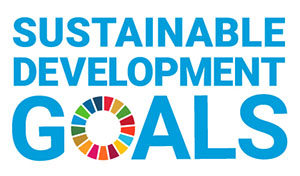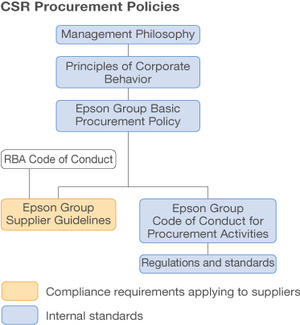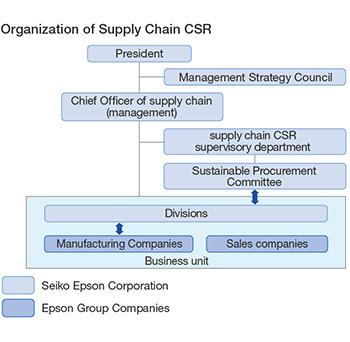Vision
- Organization
- Key Goal Indicators (KGI) and Key Performance Indicators (KPI)
- Evaluation by External Parties
Supply Chain CSR Vision
Epson aspires to be an indispensable company, one that seeks to build mutually beneficial relationships with all its business partners, including suppliers. Toward this end, we ask our suppliers to uphold the highest standards of integrity and ethics while, at the same time, respecting their autonomy and independence.
In 2021, Epson identified four materialities (priority issues) that it should address to help solve societal issues and advance toward its aspirational goal of achieving sustainability and enriching communities. Epson selected 12 Key Sustainability Topics that it will act on to achieve these. Realizing responsible supply chains is listed as a Key Sustainability Topic for fulfilling our social responsibility.
We are working to achieve the key performance indicators (KPI) that have been set for each of the Key Sustainability Topics, which have been mapped to the 169 targets of the 17 Sustainable Development Goals (SDGs) of the United Nations. The entire Epson Group will contribute to achieving the SDGs targets.

As a means to enhance CSR in its own supply chains, Epson joined Responsible Business Alliance (RBA), an industry coalition comprised of electronics, retail, auto and toy companies dedicated to responsible business conduct in global supply chains. We support RBA’s mission and code of conduct, which consists of internationally recognized, ambitious CSR requirements covering human rights, health and safety, the environment, and ethics. The RBA Code of Conduct is regularly reviewed and revised to establish common requirements that the electronics industry should work toward together.
As a Regular Member of the RBA, Epson is expected to observe the RBA Code of Conduct and meet its supply chain due diligence obligations at a high level. Accordingly, in addition to ensuring compliance in our own operations, we ask our suppliers to observe the requirements and promote CSR across the entire supply chain.

Sustainable Procurement Policy
In Principles of Corporate Behavior, Epson describes principles of conduct that must be practiced in order to achieve the goals stated in Epson’s Management Philosophy. Building and maintaining mutually beneficial relationships with suppliers is one of these principles, as are CSR-related issues such as respect for human rights, environmental impact mitigation, compliance, and responsible sourcing of minerals.
The Epson Basic Procurement Policy sets forth fundamental procurement practices. We engage in procurement activities that comply with international rules and the laws and regulations of all nations, fulfilling our social responsibilities, including those related to human rights and the environment. We build sustainable supply chains by forging partnerships of mutual trust with our suppliers based on fairness and mutual benefit. We also work with our suppliers to stabilize and optimize quality, prices, and delivery times to deliver products and services of value to our customers. Under these overarching policies, we have established the Epson Group Supplier Guidelines. We provide our suppliers with the Guidelines to familiarize them with the fundamental procurement requirements to which we ask them to adhere.
The Epson Group Supplier Guidelines include a Code of Conduct pertaining to labor(human rights), health and safety, environment, ethics, and management systems. This Code of Conduct is based on the Code of Conduct of the Responsible Business Alliance (RBA), a coalition dedicated to supply chain CSR.

Supply Chain CSR Strategy
Epson aims to help solve societal issues and achieve sustainable growth through sustainability initiatives that are aligned with the Principles of Corporate Behavior, which is based on the idea of building social trust, the concept that underlies Epson’s Management Philosophy. Not only do we comply with local laws and regulations in the countries and regions where we operate, but we also respect international sustainability initiatives such as the Sustainable Development Goals (SDGs) and the RBA code of conduct.
Furthermore, as stated in the United Nations Guiding Principles, our responsibility extends to our supply chain. Based on the company policy "to achieve sustainability and enrich communities", we have strategically defined key mid- to long-term supply chain CSR action items from the perspective of "human rights" and "sustainability”.
These actions will also lead to the achievement of the SDGs by the 2030 target year.

Organization
The chief officer of supply chain management (SCM), a member of Seiko Epson's management leadership team, promotes social responsibility in supply chains in conjunction with all entities within the Epson Group.
Targets and action plans are discussed by the CSR Procurement Committee, a cross-organizational body consisting of members from all business divisions and procurement departments of Epson Group companies, with administrative support provided by the Head Office department responsible for supply chain CSR. The committee ensures that the plans are communicated and implemented throughout the Group. The head of Supply Chain Management (SCM) regularly reviews the progress of these activities and reports to the Sustainability Strategy Council, a corporate management body that includes board members. Important matters are also submitted to the Council for deliberation.

Key Goal Indicators (KGI) and Key Performance Indicators (KPI)
To realize our vision for socially responsible supply chains, we have positioned this initiative as one of Epson’s key sustainability themes. We set mid-term goals (KGI) and annual targets (KPI), and actively promote related activities across the organization.
Mid-Term Goals (to be achieved by March 31, 2026)
Socially responsible procurement: Ensure that all major suppliers are ranked low risk in terms of CSR.
Responsible mineral sourcing: Make products conflict-free1 and disclose product information.
1 Use only conflict-free smelters and refiners certified under the RMI’s Responsible Minerals Assurance Program (RMAP).
FY2024 Action Items and Results
| Action Items and KPI | Result | |
|---|---|---|
| 1 | Maintain and improve the supply chain CSR 1) Return rate of Supplier Guidelines Agreement Letter: 95% (2500 companies) of Major suppliers of direct materials1 and indirect materials2 2) CSR SAQ risk level: Zero (0%) Major suppliers of direct and indirect materials rated high risk3 |
1) 94.4% (2,916 companies / 3,089 companies) 2) No Major direct material suppliers were rated high-risk (0 sites / 676 sites), and no Major indirect material suppliers were rated high-risk (0 sites / 438 sites). |
| 2 | Strengthening conflict mineral surveys 1) Survey return rate: 100% 2) Provision of smelter or refiner (SOR) information to suppliers: monthly |
1) Survey return rate: CMRT(3TG) 99.6% EMRT(cobalt) 99.1% 2) Once a month, 12 times a year |
| 3 | Strengthening supply chain BCM4 Impact on sales from supply chain disruptions: zero (0) |
1) Impact on sales from supply chain disruptions: zero (0) |
1 Direct materials: raw materials and parts required in product assembly, subcontracting of processing, etc.
2 Indirect materials: factory supplies that are not direct materials, machinery and equipment, public relations and advertising, logistics, outsourcing, temporary staffing, etc.
3 High risk is defined as a score below 60 points when assessed using RBA-Online, or below 65 points when assessed using Epson’s own Self-Assessment Questionnaire (SAQ).
4 BCM: business continuity management
FY2025 Action Items and KPI
| Action Items | KPI | |
|---|---|---|
| 1 | Maintain and improve the supply chain CSR | 1) Supplier CSR risk level: No high-risk2 Major direct material1 suppliers 2) Supplier CSR risk level: No high-risk2 on-site service providers and staffing agencies 3) Survey return rate: 100% |
| 2 | Strengthening conflict mineral surveys | 1) Survey return rate: 100% 2) Provision of smelter or refiner (SOR) information to suppliers: monthly (12 times/year) |
| 3 | Strengthening supply chain BCM3 | 1) Impact on sales from supply chain disruptions: zero (0) |
1 Direct materials: raw materials and parts required in product assembly, subcontracting of processing, etc.
2 High risk is defined as a score below 60 points in the SAQ, or the presence of unresolved Priority non-conformances identified through audits, including RBA’s Validated Assessment Program (VAP).
3 BCM: business continuity management
External Recognition
Supply chain CSR is evaluated by many rating agencies as part of the "S" (Social) component of ESG (Environmental, Social, and Governance) assessments. Among the supply chain CSR topics examined are policies, human rights due diligence, and responsible sourcing of minerals.
Epson's efforts and achievements in supply chain CSR have received recognition from various ESG rating agencies.
Seiko Epson Corporation has continued to earn high ratings in sustainability assessments by France-based EcoVadis. In 2024, EcoVadis awarded Seiko Epson a Platinum medal. The Platinum medal1 was established for the top 1% of the companies assessed worldwide in 2020 and approximately 130,000 companies were assessed in 2024. Seiko Epson was awarded Platinum medal for three consecutive years from 2020 to 2022. In addition to an overall score, EcoVadis provides scores for Environmental, Labor and Human Rights, Ethics, and Sustainable Procurement Performance. Seiko Epson received its highest score in Sustainable Procurement, an evaluation theme that includes supply chain human rights initiatives, environmental initiatives, and responsible minerals sourcing.

1 Platinum medal: A new rating established in 2020 in the EcoVadis sustainability assessment. Recipients must be in the top 1% and earn a certain score. (The minimum score for Platinum was 75 from 2020 to 2022, 78 in 2023, and then raised to 80 from January to June 2024 and then to 81 from July 2024.)



